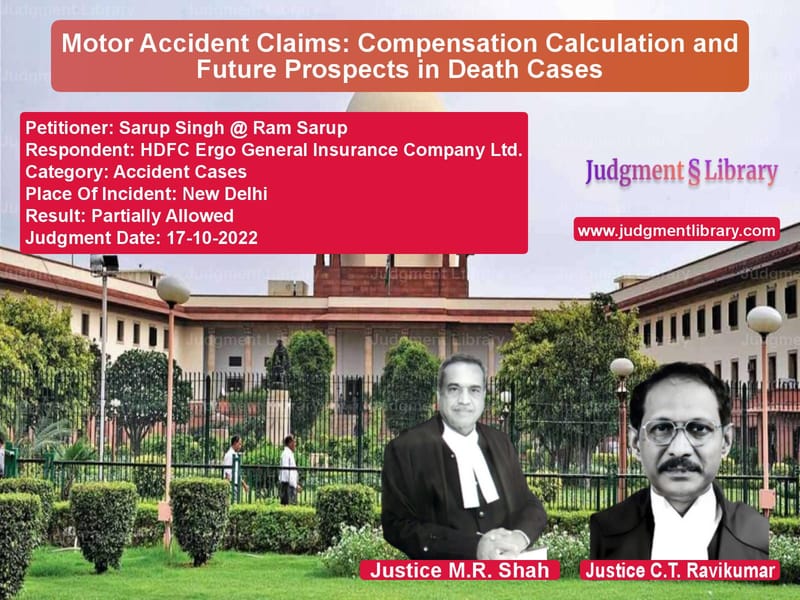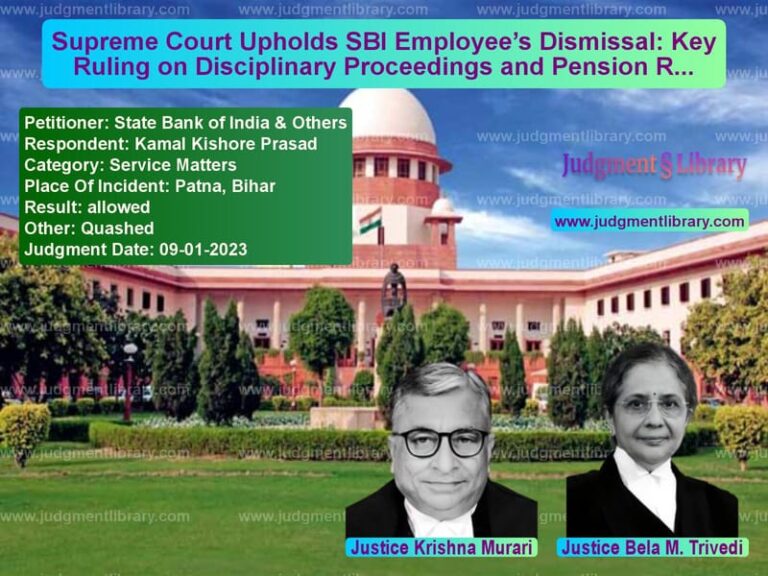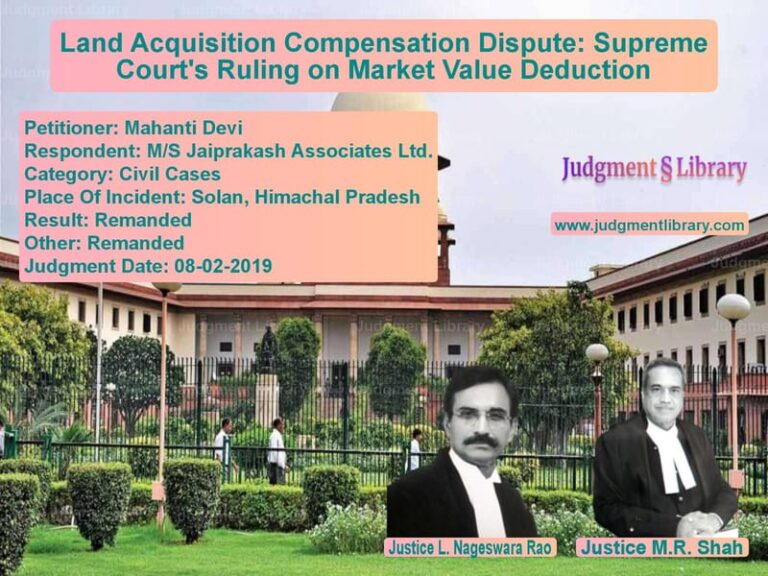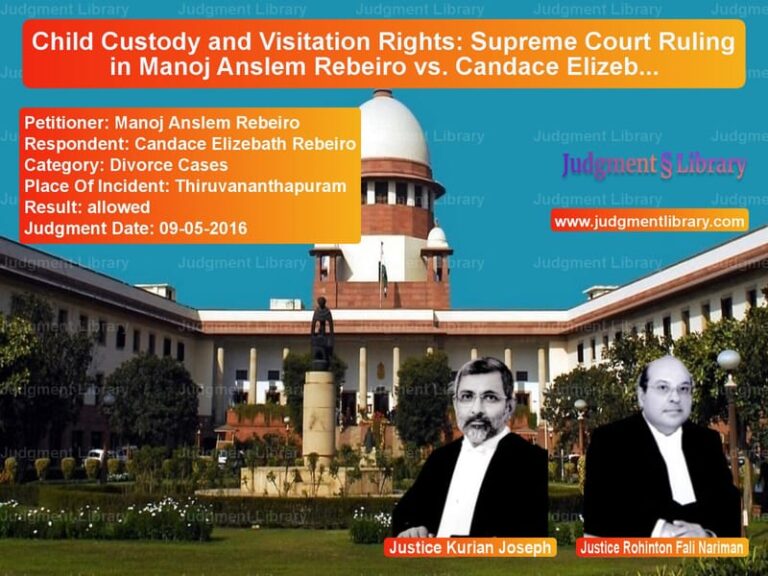Motor Accident Claims: Compensation Calculation and Future Prospects in Death Cases
The present case involves a dispute over the compensation amount awarded for the death of a young individual in a motor vehicle accident. The appellant, Sarup Singh, approached the Supreme Court to challenge the reduction of compensation from Rs. 20,64,000/- as initially awarded by the Motor Accident Claims Tribunal (Tribunal) to Rs. 11,34,136/- by the High Court. The case primarily deals with the appropriate calculation of compensation for loss of dependency, the inclusion of future prospects, and the interest rate applicable to the compensation amount.
Background:
The deceased, at the time of the accident, was 28 years old. The appellant’s family, including the wife, minor daughter, father, and sister of the deceased, filed the claim petition before the Tribunal. The Tribunal, after considering the notional income of the deceased at Rs. 10,000 per month, added 30% towards future prospects and deducted 1/4th for the deceased’s personal expenses. A total of Rs. 20,64,000 was awarded under various heads, including Rs. 19,89,000 for loss of dependency, Rs. 25,000 for loss of consortium, Rs. 50,000 for funeral expenses, and Rs. 50,000 for loss of estate, along with interest at 9% per annum.
However, the insurance company appealed against this amount, and the High Court reduced the compensation. The High Court considered the notional income at Rs. 6,500 per month, deducted 1/3rd for personal expenses, and awarded Rs. 8,84,136 for loss of dependency. The High Court also reduced the interest rate from 9% to 6% per annum and awarded Rs. 1,00,000 for loss of consortium and Rs. 1,00,000 for loss of love and affection for the minor child. The appellant challenged this reduction in compensation, leading to the present appeal before the Supreme Court.
Appellant’s Arguments:
The appellant argued that the High Court had erred in reducing the notional income to Rs. 6,500 per month and in failing to account for future prospects, which should have been included as per the decision in the case of National Insurance Company Limited v. Pranay Sethi. The appellant contended that the compensation for loss of dependency should have included a 40% increase for future prospects, as per the Supreme Court’s decision in Pranay Sethi. Furthermore, the appellant challenged the reduction in the interest rate, arguing that 9% interest per annum was appropriate given the delay in proceedings.
Respondent’s Arguments:
The respondent, HDFC Ergo General Insurance Company, argued that the High Court’s decision to reduce the compensation amount was based on a proper assessment of the facts and circumstances. The respondent highlighted that the Tribunal had awarded compensation based on a higher notional income and future prospects than what was reasonable. The respondent also defended the reduction in the interest rate, asserting that the lower rate of 6% was appropriate given the delay in the case’s proceedings.
Court’s Analysis:
The Court examined the calculation of compensation, particularly the loss of dependency, and noted that the High Court had failed to consider the future prospects of the deceased. The Court relied on the ruling in Pranay Sethi’s case, which mandates a 40% rise towards future prospects for individuals between the ages of 25 and 50. The Court also found that the notional income of Rs. 6,500 per month, as determined by the High Court, was reasonable. Therefore, the Court calculated the loss of dependency by applying the 40% rise for future prospects and adjusting for the deceased’s personal expenses. The Court awarded a total of Rs. 12,37,790 for loss of dependency, including the increase for future prospects.
The Court also ruled that the claimants were entitled to Rs. 1,20,000 under the head loss of consortium, with Rs. 40,000 each for parental, spousal, and filial consortium. Additionally, the Court awarded Rs. 30,000 under the conventional head for funeral expenses and loss of estate. The Court further found that the High Court had erred in reducing the interest rate from 9% to 6% per annum and held that the claimants were entitled to interest at the rate of 7.5% per annum from the date of filing the claim petition until realization.
Judgment:
The Supreme Court allowed the appeal in part and modified the High Court’s judgment. The Court held that the appellants were entitled to a total compensation of Rs. 13,87,790, with interest at 7.5% per annum. This amount included Rs. 12,37,790 for loss of dependency, Rs. 1,20,000 for loss of consortium, and Rs. 30,000 for funeral expenses and loss of estate. The Court also directed the insurance company to pay the compensation with interest from the date of filing the claim petition until realization.
Conclusion:
This case highlights the importance of including future prospects in compensation calculations, particularly in cases involving the death of young individuals. It also reaffirms the principle that incidental claims for loss of consortium and funeral expenses are legitimate and should be accounted for in the total compensation. The Court’s decision provides clarity on the appropriate calculation of compensation and interest rates in motor accident claims, ensuring a fair outcome for the claimants.
Petitioner Name: Sarup Singh @ Ram Sarup.Respondent Name: HDFC Ergo General Insurance Company Ltd..Judgment By: Justice M.R. Shah, Justice C.T. Ravikumar.Place Of Incident: New Delhi.Judgment Date: 17-10-2022.
Don’t miss out on the full details! Download the complete judgment in PDF format below and gain valuable insights instantly!
Download Judgment: sarup-singh-@-ram-sa-vs-hdfc-ergo-general-in-supreme-court-of-india-judgment-dated-17-10-2022.pdf
Directly Download Judgment: Directly download this Judgment
See all petitions in Road Accident Cases
See all petitions in Compensation Disputes
See all petitions in Motor Vehicle Act
See all petitions in Judgment by Mukeshkumar Rasikbhai Shah
See all petitions in Judgment by C.T. Ravikumar
See all petitions in partially allowed
See all petitions in supreme court of India judgments October 2022
See all petitions in 2022 judgments
See all posts in Accident Cases Category
See all allowed petitions in Accident Cases Category
See all Dismissed petitions in Accident Cases Category
See all partially allowed petitions in Accident Cases Category







